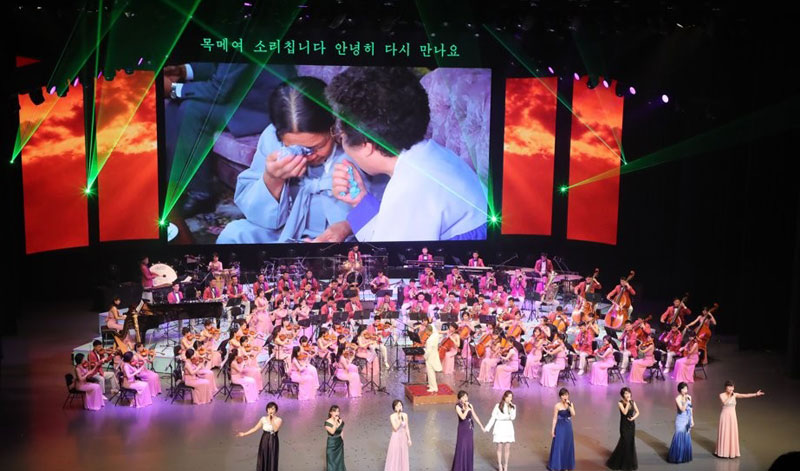
The North Korean authorities have recently banned approximately 70 items deemed “impure propaganda materials” from being viewed or distributed within the country. Officials have informed residents of the punishments to be faced if the ban is violated.
A large number of propaganda materials manufactured by the regime, including a video of a Moranbong Band performance, is on the list. The authorities have revealed that the bans have arisen due to political issues with the actors, singers or producers of the materials.
“The authorities have created criteria and listed impure videos and magazines and informed the people,” said a North Hamgyong Province-based source.
An inminban (people’s unit, a type of neighborhood watch) meeting was held on September 30 in regards to the ban, the source said. The inminban heads told residents to bring paper and pencils to the meeting and had the residents in their district write down the “Criteria concerning the Restrictions on Impure Propaganda Material” on paper over the course of about an hour.
According to multiple sources in North Hamgyong Province and Ryanggang Province, the list includes around 75 works, including a significant number of regime-created propaganda materials that praise the Party and Kim family.
The videos on the list made by the Moranbong Band include “Mother’s Voice” and “Following the Party to the End,” which are both DVDs. “Mother’s Voice” praises the Kim family, so there questions as to why it was put on the list.
Moreover, the Konghun Song and Dance Ensemble’s “The Sound of Thunder on Jongil Peak,” a DVD, the songs “The Blue Sky of My Country” and “Forever Remember the Motherland,” as well as a number of other movies including “Taehongdan Chief Secretary,” “Fate Full of Vicissitudes”, “Our Scent” and “The Unseen Heroes.”
During an information session for residents, the coordinator said that the list “includes good songs and movies, but there is a reason for them being banned. The actors or singers in these works harbored discontent toward the state and were dealt with politically.”
North Korea has also prohibited the distribution and viewing of compilations with Chinese TV male and female leads and other materials that include “mixed” [read: impure] settings, foreign movies that have been shown on the country’s Mansudae Channel, and portraits of the Great Wonsunims (Kim Il Sung and Kim Jong Il) saved on mobile phones or USB drives.
The source also reported that pornographic content was included.
These prohibition criteria appear aimed at preventing damage to the authority of the Kim family and to block outside information, but there are questions over how effective the ban will be given that North Koreans generally don’t watch such materials with political motives and the fact that they have no issues watching Chinese videos.
The ban on redistributing foreign movies already shown on the Mansudae Channel was said to be due to people selling “state property” for a profit.
“Even after hearing the authorities’ explanations for the ban, they don’t understand it and think it’s absurd. There are a lot of materials on the list and the criteria is a bit unclear so people are unsure what’s permitted and what isn’t,” a source in Ryanggang Province said.
“The authorities have ordered that the criteria concerning the banned items and the list itself be pinned to the wall in each residence so that all people – young and old – can view it everyday. The heads of the inminbans are said to be checking whether they have been placed on the walls, which people think is ridiculous.”




















